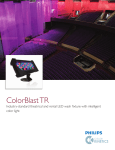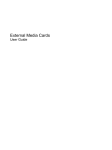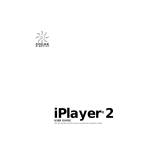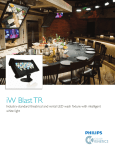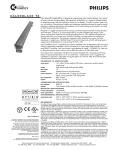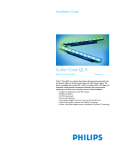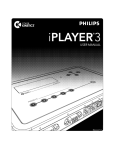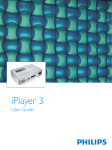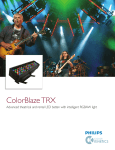Download ColorBlast 12 Powercore User Guide
Transcript
ColorBlast 12 Powercore u s e r g u i d e Scope of This User Guide Planning Suggestions The goal of this user guide is to explain in an easily understood language the necessary steps to install ColorBlast 12 Powercore and assure peak performance. Its intended use is for reference only, by persons who are fully qualified. This document should never be considered a substitute for any provisions of a regulation or state and/ or local code. When planning a ColorBlast 12 Powercore installation, Color Kinetics suggests doing the following: • Consult an Electrical Inspector to review all wiring plans. • Refer to local and state codes for installation compliance. • Create a Layout Plan drawing. • Create a Mapping Grid. Use this grid to record serial numbers for easy reference and addressing. • Consult Color Kinetics Application Engineering Services as needed at [email protected]. • Get detailed wiring diagrams and additional support from www.colorkinetics.com/support. Identification and Warnings of Safety Hazards Color Kinetics Incorporated 10 Milk street, Suite 1100 Boston, MA 02108 USA Tel 888 Full RGB Tel 617 423 9999 Fax 617 423 9998 [email protected] www.colorkinetics.com ITEM# 123-000005-00 (UL, White, Frosted Lens) 123-000005-01 (UL, Black, Frosted Lens) 123-000005-02 (EU, White, Frosted Lens) 123-000005-03 (EU, Black, Frosted Lens) 123-000005-04 (UL, White, Clear Lens) 123-000005-05 (UL, Black, Clear Lens) 123-000005-06 (EU, White, Clear Lens) 123-000005-07 (EU, Black, Clear Lens) This product is protected by one or more of the following patents: U.S. Patent Nos. 6,016,038, 6,150,774 and other patents listed at http://colorkinetics.com/patents/. Other patents pending. DRY DAMP WET ©2005-2006 Color Kinetics Incorporated. All rights reserved. Chromacore, Chromasic, Color Kinetics, the Color Kinetics logo, ColorBlast, ColorBlaze, ColorBurst, ColorCast, ColorPlay, ColorScape, Direct Light, iColor, iColor Cove, iPlayer, Optibin, Powercore, QuickPlay, Sauce, the Sauce logo, and Smartjuice are registered trademarks and DIMand, EssentialWhite, eW, IntelliWhite, iW, and Light Without Limits are trademarks of Color Kinetics Incorporated. PUB-000130-00 Rev. 02 Specifications subject to change without notice. Introduction Color Kinetics® ColorBlast® 12 Powercore marries Color Kinetics' popular ColorBlast 12 with Powercore™ technology. This combination offers wall-washing, wall-grazing, spot lighting and large alcove lighting in an easy-to-install, Powercore-based fixture. This guide contains important information on planning, installing, and operating your new ColorBlast 12 Powercore. For your protection, read it carefully and save it for future reference. Included In This Box • • • • • C olorBlast 12 Powercore (2) 8-32 screws for indoor installations (4) 10-24 stainless steel screws for outdoor installations (1) 3/32" hex key wrench User Guide Additional Items Needed • 4” Electrical junction box (rated for your application) with 3.5” • • • • • center-to-center distance for mounting locations. Refer to the manufacturer's literature for additional items required for mounting or sealing. D ata Enabler (Item# 106-000003-04/05) C ontroller - Color Kinetics or DMX compatible Light addressing tool: Color Kinetics Zapi (Item# 103-000005-00, US/103-000005-01, EU) or Serial Addressing Software (SAS) with iPlayer 2 or Smart Jack 3 12 AWG, 4 conductor, copper wire Conduit and hubs as required Optional Items • 3/16" OD braided safety cable and hardware as required. In accordance with ANSI Z535.4-2002, the following system identifies the severity of the hazards associated with the products: “danger” Imminently hazardous situation which, if not avoided, will result in death or serious injury. “warning”Potentially hazardous situation which, if not avoided, could result in death or serious injury. “caution” Potentially hazardous situation which, if not avoided, may result in minor or moderate injury or property damage. Also used to alert against unsafe practices. ignoring a hazard will void any warranty. danger: Ensure that main power supply is off before installing or wiring, ColorBlast 12 Powercore. danger: ColorBlast 12 Powercore must be installed by a qualified electrician in accordance with NEC and relevant local codes. warning: Do not attempt to install or use ColorBlast 12 Powercore until you read and understand the installation instructions, and safety labels. warning: Do not use ColorBlast 12 Powercore if the lens, housing, or power cables are damaged. warning: As dictated by a Structural Engineer and/or local code, install safety cables to ColorBlast 12 Powercore fixtures. warning: When using safety cables, ensure that they comply to the specifications given in this user guide. warning: ColorBlast 12 Powercore has line voltage risk of shock and no user serviceable parts. Do not attempt to open the fixture. caution: Use appropriate materials and mounting methods to support the fixture adequately. caution: Do not exceed the specified voltage and current input. caution: Do not exceed the maximum number of specified fixtures in a light run. caution: Do not use sharp tools near or on the fixture lens. caution: Do not hot swap. Ensure that power to the fixture is off before connecting or disconnecting fixtures. caution: ColorBlast 12 Powercore is a Class 2 LED product with LED radiation. Do not stare into beam or view directly with optical instruments. note: The instructions and precautions set forth in this user guide are not necessarily all-inclusive, all conceivable, or relevant to all applications as Color Kinetics cannot anticipate all conceivable or unique situations. Owner/User Responsibilities It is the responsibility of the contractor, installer, purchaser, owner and user to install, maintain, and operate ColorBlast 12 Powercore in such a manner as to comply with all state and local laws, ordinances, regulations, and the American National Standard Institute Safety Code. PlanNING the Installation ColorBlast 12 Powercore installation requires planning to ensure a timely, successful installation with minimal complications and down time. Installation Considerations • The location of Data Enabler in relationship to lights. The maximum distance that the Data Enabler can be located from the last fixture in a series, or each individual fixture in a home-run installation is 175 feet (53 m). The maximum total cable run is 400 feet (122 m). • Calculate the number of fixtures per Data Enabler. Use the Configuration Calculator located at www.colorkinetics.com/ support/install_tool to calculate the number of fixtures you can put on a Data Enabler. The fixtures-to-Data Enabler ratio is determined by the parameters of your installation. Installation parameters include all or part of the following: line voltage, circuit load, voltage drop, and cable lengths. • Location of the fixture and method of attaching. Mounting hardware is dictated by the mounting surface. Ensure that the hardware used is appropriate for the mounting surface. • Install and wire the Data Enabler after installing ColorBlast 12 Powercore fixtures. Refer to the Data Enabler Installation Guide. steps to a successful installation 1. 2. 3. 4. 5. Record serial numbers and identify fixtures as you unpack them. Install the fixtures. Install the Data Enablers. Connect power and data from the Data Enabler to the fixtures. Address the fixtures. Recording Serial Numbers 1. As you unpack the fixtures record the serial numbers. Each ColorBlast 12 Powercore has a unique serial number programmed at the time of manufacture. 2. Write the serial numbers onto a Mapping Grid or use a bar code scanner along with Color Kinetics Serial Addressing Software to record each serial number. Color Kinetics Serial Addressing Software and instructions are located at www.colorkinetics.com/support/downloads. 3. Using the Layout Plan, assign the fixture to a layout position in the installation. 4. Using a weatherproof label, identify the fixtures' installation positions based on the Layout Plan. Place the identifying label in an inconspicuous location noting the order or placement in the installation. This step not only minimizes installation mistakes, but aids in post-installation programming of your light shows. Installing ColorBlast 12 Powercore ColorBlast 12 Powercore fixtures are junction box mounted. Ensure that the junction box used in your installation is suitable for the environment. ColorBlast 12 Powercore can be installed in a daisy-chained series or each fixture can be home-run to a common junction box. When installing ColorBlast 12 Powercore fixtures, the input earth ground, canopy earth ground, and the fixture cable earth ground must all be connected together. Failure to make these connections could result is death or serious injury. warning: Through-Base Cable Assembly For all installations where the cable must go through the canopy base, follow the directions below to prevent cable damage and to create a water-tight seal for outdoor installations. 1. Screw the liquid-tight fitting into the canopy base. The O-ring must be seated against the canopy opening to ensure a watertight seal. 2. Insert the fixture cable through the dome nut. Loosen dome nut if necessary. Pull the cable through the fitting. Leave enough cable above the fitting to ensure full fixture head rotation. 3. Tighten dome nut to seal the cable. After 24 hours, tighten the dome nut again to ensure proper sealing force and water-tight seal. See Fig. 1. Fig. 1 LIQUID-TIGHT FITTING CABLE O-RING DOME NUT CANOPY BASE LOCK NUT Daisy Chain Fixtures 1. P ull 12AWG, 4-conductor, stranded copper wiring between junction boxes in a series. The maximum cable run from Data Enabler to the last fixture in a series is 175 feet (53 m). 2. T rim fixture cable to fit in junction box leaving enough cable to make wiring connections. 3. Use wire nuts to connect line (Black/Brown), neutral (White/ Gray), ground (Green/Yel), and data (Red/Black). note: For outdoor installations, insert fixture cable through junction box gasket before making wire connections. 4. Tuck wire connections into junction box and use provided screws to attach the fixture to the junction box. See Fig. 2. note: For outdoor installations, ensure that the gasket is compressed evenly for a water-tight installation. Fig. 2 Daisy Chain Connection Maximum run length from Data Enabler to last fixture in series: 175 feet (53 m) Gasket 12AWG, 4-conductor Stranded Copper Cable From Data Enabler Home Run Fixtures 1. P ull 12AWG, 4-conductor, stranded copper wiring from Data Enabler to a common junction box, and from the common junction box to each fixture's junction box. The maximum cable run from Data Enabler to any fixture in a series is 175 feet (53 m), and the maximum total cable run is 400 feet (122 m). 2. T rim fixture cable to fit in junction box leaving enough cable to make wiring connections. 3. Use wire nuts to connect line (Black/Brown), neutral (White/ Gray), ground (Green/Yel), and data (Red/Black). note: For outdoor installations, insert fixture cable through junction box gasket before making wire connections. 4. Tuck wire connections into junction box and use provided screws to attach the fixtures to junction boxes. note: For outdoor installations, ensure that the gasket is compressed evenly for a water-tight installation. 5. In the common junction box, connect the wires from each fixture to the lead wire from Data Enabler. See Fig. 3. Fig. 3 12AWG, 4-conductor Stranded Copper Cable Home Run To Common Junction Box. Home Run Connection 2. Remove the two screws that attach the cable bracket to the fixture. Loop the safety cable over the cable bracket and reattach to the fixture. 3. Attach the safety cable to the mounting surface. For the proper mounting method of the safety cable to the installation surface, refer to a Structural Engineer or applicable standards for your specific application. The safety cables used in the installation should meet the following minimal requirements: material: 316 Stainless Steel size: 5/64-inch (0.78-inch nominal diameter) or larger, minimum break load must be greater than 400 pounds. Maximum diameter is 3/16-inch. construction: 7 x 7 (49 wires) performed stranded end terminations: Determined by installer and/or owner mounting method: Determined by installer or owner Positioning Fixtures Rotate the light fixture to the desired position. Using the provided hex key wrench, tighten the set screws located on the base to lock in place. Tilt the fixture to the desired angle and tighten the set screws located on the front of housing to lock. See Fig. 4 for location of set screws. note: ening. For permanent installations, use thread locker to prevent loos- DMX OUT* (CAT5) Determine number of Data Enablers needed for your installation and the location of each. Use the Configuration Calculator located at www.colorkinetics.com/support/install_tool to calculate the number of Data Enablers required for your installation. note: Install Data Enabler according to state and local codes. Run power and data to Data Enabler and make connections. Refer to the Data Enabler Installation Guide for complete instructions. Connecting Fixtures to the Data Enabler DATA ENABLER LINE - BLACK (BROWN, EU) NEUTRAL - WHITE (GRAY, EU) GROUND - GREEN/YELLOW DATA - RED (BLACK, EU) FRONT VIEW From Power Source D L L N N G G DMX OUT* To Lights DMX/ETHERNET IN *Not Available For Ethernet Rotate fixture at base, lock in place. Attaching the Safety Cable Each fixture is designed for use with a safety cable. When dictated by local or state code, or by a Structural Engineer, attach a safety cable from the fixture to the mounting surface. 1. Located on the back of the ColorBlast 12 Powercore fixture is a safety cable bracket. See Fig. 5. Daisy Chain Wiring After fixtures are installed and fixture-to-fixture wiring is complete, run the leader cable from the first fixture in the daisy chain run to Data Enabler. See Fig. 7. Fig. 7 Daisy Chain Connection Maximum run length from Data Enabler to last fixture in series: 175 feet (53 m) For protection from extreme temperatures, ColorBlast 12 Powercore has been designed with a temperature monitoring feature. If operating temperatures rise to an unsafe level, a compensation circuit is triggered and the ColorBlast 12 Powercore operation is interrupted causing the lights to turn dull red. After 30 minutes the lights will auto-cycle and return to full intensity. To prevent additional power shut-downs, determine the cause of the overheating and correct the problem. If any problems occur during usage, unplug the product immediately and call or email Color Kinetics Technical Support Group at: 1-888-FULL RGB or 617-423-9999 or [email protected]. ColorBlast 12 Powercore Specifications DMX/Ethernet IN (CAT5/CAT5e, RJ45) color range Addressing the Fixtures The ColorBlast 12 Powercore fixtures are pre-addressed to light number 1 at the time of manufacture. Address each fixture with a new light number, as needed, using one of the following methods: zapi: Use Color Kinetics Zapi to reset the DMX address for each serial number. Refer to the Zapi User Guide for step-by-step addressing instructions. sas: When using a PC with iPlayer 2 or a PC with Smart Jack 3 to address the serial numbers, download the Serial Addressing Software and instructions from www.colorkinetics.com/support. light system composer: When using ColorBlast 12 Powercore fixtures in an Ethernet application, the lights can be addressed after installation using the Light System Composer software. Setting the DMX Address Using Zapi, SAS, or Light System Composer 1. After installing ColorBlast 12 Powercore and Data Enabler, connect power to system. 2. A ttach the DMX interface (Zapi, iPlayer 2, or Smart Jack 3) to the DMX/Ethernet IN port on Data Enabler; or attach the Light System Manager Ethernet system to the DMX/ Ethernet IN port on Data Enabler. 3. Using Zapi or Serial Addressing Software (SAS) set the light address for each fixture by entering the serial number. 4. Using Light System Composer software, discover and address all lights attached to the Ethernet system. Cleaning: Using a soft cloth, clean surface with mild soap and water or window cleaner. Lubricating: As needed, apply light household oil to the hinges. IMPORTANT INFORMATION Strobe Warning SAFETY CABLE 12AWG, 4-Conductor Stranded Copper Cable 100-240VAC END USER SPECIFIES REQUIRED END TERMINATOR AND ANCHORING DMX OUT* (CAT5) *Data Out is not available for Ethernet DMX/Ethernet IN (CAT5/CAT5e, RJ45) Controller Controller ROUTINE MAINTENANCE Fig. 5 This flicker rate applies only to the overall output of any group of lights in direct view. However, when more than one strobe light is used, the flashes should be synchronized. End users should also consider issuing a warning, alerting audience or viewers to the presence of strobe lighting. Temperature Monitoring 12AWG, 4-conductor, Stranded Copper Cable Home Run To Common Junction Box. Turn off power before installing Data Enabler or ColorBlast 12 Powercore. Failure to do so could result in death or serious injury. Fig. 6 Aim fixture and lock in place. Home Run Connection Maximum run length from Data Enabler to any fixture: 175 feet (53 m) Maximum total cable run: 400 feet (122 m) 100-240VAC Refer to the Fig. 6 for fixture-to-Data Enabler wire color correspondence. Fig. 4 Fig. 8 Installing the Data Enabler warning: Maximum run length from Data Enabler to any fixture: 175 feet (53 m) Maximum total cable run: 400 feet (122 m) Home Run Wiring After fixtures are installed and each fixture is wired to the leader cable in a common junction box, run the leader cable from the first fixture in the daisy chain run to Data Enabler. See Fig. 8. There is some anecdotal evidence that strobe lighting may induce epileptic symptoms in certain susceptible individuals, although no associated product warnings have been issued by United States government according to the Food and Drug Administration. If strobe lights are used, some international regulatory agencies1 recommend keeping flicker rates at or below four flashes per second (as less of the flicker-sensitive population will then be at risk of an attack). source beam angle housing lens connectors listings 16.7 million (24-bit) additive RGB colors; continuously variable intensity output range 36 high-intensity RGB LEDs 10º clear lens, 23º ground lens Die cast aluminum, powder coated Soft-focus tempered glass or clear tempered glass Unified power and data cable UL/cUL, CE Communication Specifications data interface control Color Kinetics Data Enabler Color Kinetics full line of controllers including Light System Manager or other DMX512 (RS485) sources Electrical Specifications input power consumption power factor 100-240VAC, 50-60 Hz 50W @ 110-240VAC (60W @ 100VAC) 0.95 or greater @ 120VAC Environmental Specifications temperature range protection rating -40ºF to 122ºF (-40ºC to 50ºC) operating temperature -4ºF to 122ºF (-20ºC to 50ºC) starting temperature IP66 (Suitable for wet locations.) LED Source Life IIn traditional lamp sources, lifetime is defined as the point at which 50% of the lamps fail. This is also termed Mean Time Between Failure [MTBF]. LEDs are semiconductor devices and have a much longer MTBF than conventional sources. However, MTBF is not the only consideration in determining useful life. Color Kinetics uses the concept of useful light output for rating source lifetimes. Like traditional sources, LED output degrades over time (lumen depreciation) and this is the metric for SSL lifetime. LED lumen depreciation is affected by numerous environmental conditions such as ambient temperature, humidity, and ventilation. Lumen depreciation is also affected by means of control, thermal management, current levels, and a host of other electrical design considerations. Color Kinetics systems are expertly engineered to optimize LED life when used under normal operating conditions. Lumen depreciation information is based on LED manufacturers’ source life data as well as other third party testing. Low temperatures and controlled effects have a beneficial effect on lumen depreciation. Overall system lifetime could vary substantially based on usage and the environment in which the system is installed. Temperature and effects will affect lifetime. Color Kinetics rates product lifetime using lumen depreciation to 50% of original light output. When the fixture is running at room temperature using a color wash effect, the range of lifetime is in the range of 80,000100,000 hours. This is LED manufacturers’ test data. High output is defined as any LED device that is 1/2 watt or above. For more detailed information on source life, please see www.colorkinetics.com/lifetime. Warranty This product is sold pursuant to CK’s Standard Terms and Conditions (the “T&Cs”) which may be found at http://colorkinetics.com/howtobuy/buy/terms and which contain important provisions, including, among others, Limited Warranty, exclusions and limitations on CK’s liability for damages, and restrictions on the remedies that are available to you. 1G uide to Health, Safety and Welfare at Pop Concerts and Similar Events, HMSO Publications (UK)










